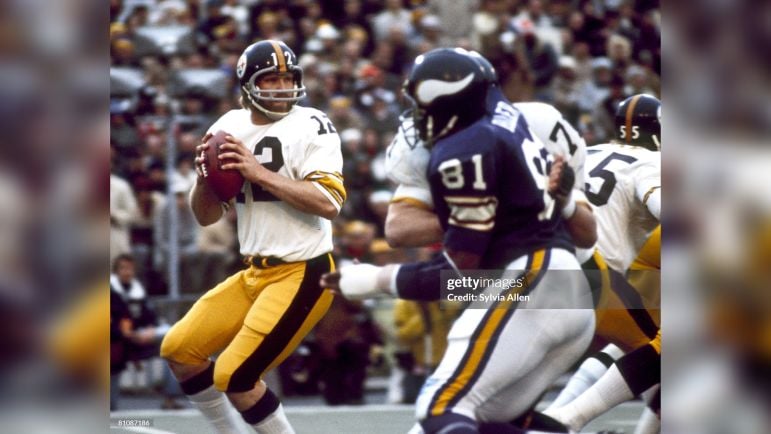Terry Bradshaw quarterbacked the first true NFL dynasty of the Super Bowl era. Bradshaw’s Pittsburgh Steelers teams won four Super Bowls in the 1970s capping off one of the greatest decade-long runs in American sports history. It’s been over fifty years since Bradshaw’s Steelers won their first Super Bowl, and they still have a strong case as the greatest dynasty in NFL history (if you separate the Brady/Belichick Patriots era into two separate dynasties). The Chiefs are the latest rendition of an NFL dynasty, but they’re a whole lot different than the ’70s Steelers.
In a recent interview posted by talkSPORT, Bradshaw expressed his pride in the continuity of the ’70s Steelers, and explained how that separates them from modern dynasties like the Kansas City Chiefs.
“The thing I’m most proud of our four Super Bowls, it was the same team,” said Bradshaw. “The only difference in all of these teams today and the teams of the ’70s is that we drafted our Super Bowl teams…In my day and time, you got drafted, you went nowhere unless you were cut or they traded you — you were stuck. There may have been on offense, no changes. On defense, maybe two. That’s pretty good drafting. So that’s the major difference.”
Bradshaw brings up an interesting point. During that run in the ’70s, the Steelers had 22 players who were on the roster for all four Super Bowls, including ten future Hall-of-Famers. It was before the salary cap and free agency existed, so players had very little negotiating power and the only way to substantially upgrade a roster was through a really good draft.
Chuck Noll and the Steelers did exactly that. They nailed draft pick after draft pick in the ’70s, culminating in the legendary 1974 class which featured four future Hall-of-Famers: Lynn Swann, Jack Lambert, John Stallworth, and Mike Webster — not to mention Donnie Shell as an undrafted free agent. They created a superteam entirely in-house, drafting, developing, and maintaining their talent.
In contrast, the Kansas City Chiefs, who’ve won three Super Bowls in the last six seasons and fell short in the Super Bowl this season, had just five players who were a part of all three wins and this year’s loss. It’s nearly impossible for great teams to keep all their players today, because star players command big contracts, and the salary cap limits the number of huge contracts on each team. This actually creates a strong case for the modern-day dynasty being more impressive than past dynasties like Bradshaw’s Steelers. But it goes both ways.
Bradshaw also explained how easy it is for teams like the Chiefs to reload in free agency.
“Then [the Chiefs] go, ‘Oh, so Tyreek Hill is not happy. We’re shipping his a** to Miami,” said Bradshaw. “But who are we going to replace him with? ‘Oh, now we’re getting Juju Smith-Schuster…Ok he’s available.”
While it’s hard to say Juju was a one-for-one replacement for Tyreek Hill, Bradshaw makes a solid point about the many ways that modern NFL teams can quickly revamp their rosters. Trades are much more frequent now, the free agency talent is plentiful, and the draft has become even easier with all of the advanced scouting and pre-draft interviewing/combine work.
You could argue back-and-forth for hours which type of dynasty is more impressive, but all I know is that Bradshaw and the Steel Curtain won four Super Bowls to Mahomes’ and the Chiefs three. And nobody was blowing them out while dominating in the trenches.
For the present-day Steelers to get back to the Super Bowl, they’re going to need to do both what Bradshaw’s Steelers did and what the Chiefs and other modern dynasties have done. They need to nail multiple drafts in a row, starting this year, and make some splash moves in free agency, as well as a few key trades.
If all those things happen, then maybe a really old Terry Bradshaw, or less-old Ben Roethlisberger will compare their great Steelers’ teams to the next Steelers dynasty.








